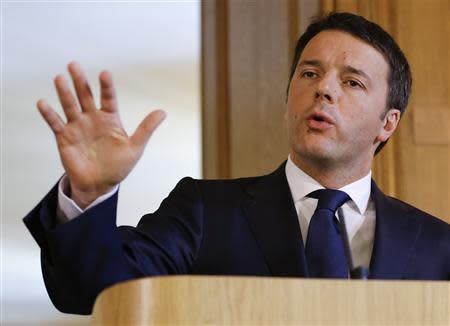By Roberto Landucci
| ROME (Reuters) - Italy passed legislation on Thursday to eliminated wasteful layers of government at the provincial level in the initial step of Prime Minister Matteo Renzi's ambitious reform agenda. Renzi has said his bill would cut the number of elected politicians by 3,000 and save around 800 million euros annually, calling it "a way of restoring hope and trust among our citizens". Italy's third premier in a year and head of the 65th government since World War Two, Renzi is also pursuing an overhaul to the electoral system to end instability that has contributed to economic stagnation and corruption in politics. The lower house of parliament voted 260-158 on Thursday to eliminate the direct election of provincial governments in favor of handing over their management to officials selected by city councilors and mayors. Italy's 110 provincial governments, which oversee services like the maintenance of roads and schools, have long been considered a superfluous swathe of bureaucracy whose tasks could be delegated to others. |  |
| Though the law was originally proposed by Renzi's predecessor Enrico Letta, Renzi seized on the measure for its symbolic cuts to the bloated political apparatus as a first step in his program of sweeping institutional reforms. Many critics and even the government's commissioner in charge of cutting public spending say it will save much less. The commissioner, Carlo Cottarelli, has said potential savings will top out at 500 million euros ($685.82 million) annually. Attempts to cut back provincial powers in past years floundered and Renzi's bill stalled in the Senate last month, forcing him to call a confidence vote to win its passage. The move to revamp the electoral system foreshadows a much bigger challenge that Renzi - at the head of a broad left-right coalition - faces in reforming the constitution and turning the Senate into a non-elected chamber to streamline the lawmaking process. Renzi has staked his political future on its passage. |
No comments:
Post a Comment